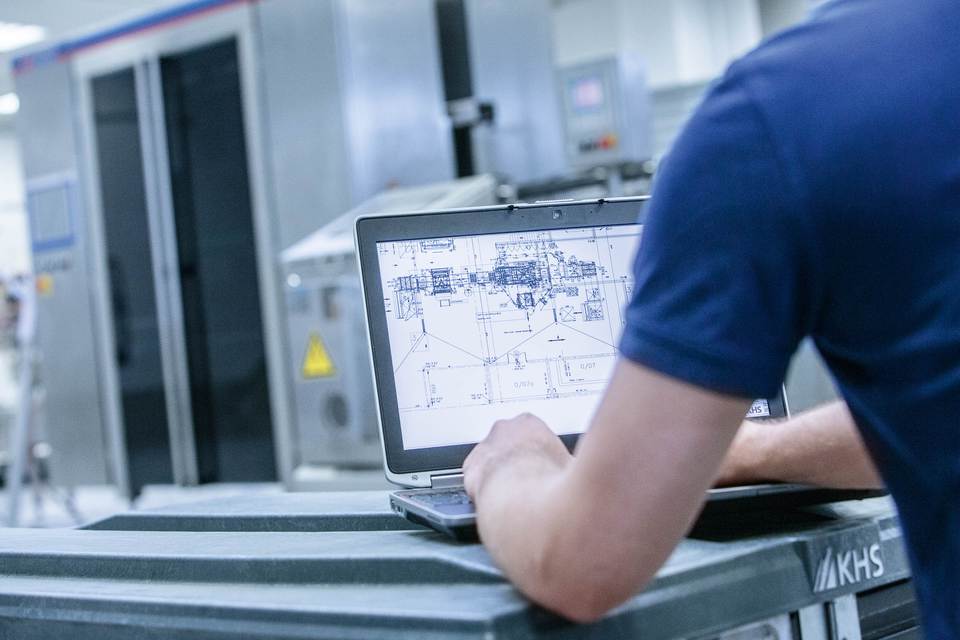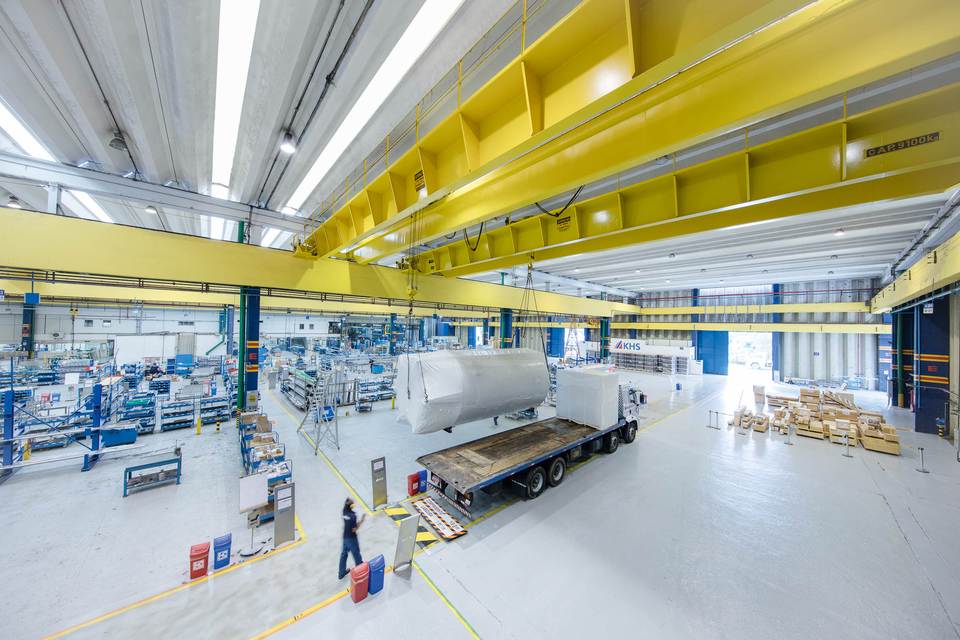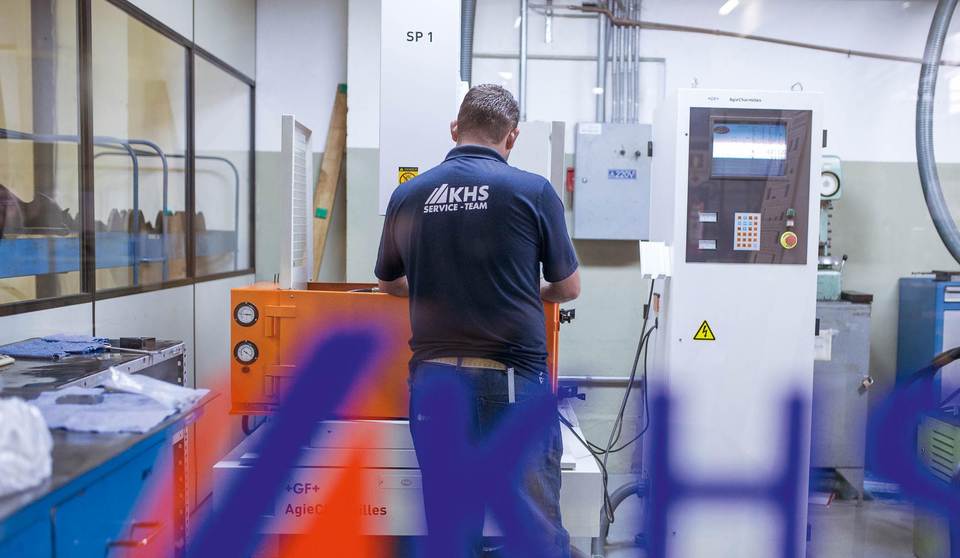Strange things happen when you’re abroad,” German poet Matthias Claudius wrote in the 18th century. Andreas Thomke, whose job as global service key account manager at KHS recently took him to Papua New Guinea, can confirm this. He was prepared for the fact that his exotic-sounding destination was likely to present him with a few challenges. He didn’t expect to have his baggage mislaid, however, and find himself facing the embarrassment upon arrival of having to buy new clothes in a country where most of the inhabitants are a head shorter than himself (Thomke is 1.90 meters tall). It’s no coincidence that the island state in the Pacific is also known as the Land of the Unexpected. Many parts of the country can only be reached by plane or ship as there are very few made roads; the frequent occurrence of tropical diseases, such as dengue fever and malaria, and a high crime rate make this country seem rather uninviting to western travelers.
“The engineers needed here have to be familiar with machines from all of KHS’ production sites.”
“In addition to all this it’s also quite difficult to find good personnel in Papua New Guinea,” says Thomke. “Even if you’ve trained people, it’s almost impossible to keep them. This is due to the many well-paying copper and gold mines here which have strong fluctuations in capacity. When there’s a boom on, personnel are literally as rare as gold dust. What makes things even more difficult is that 90% of the around 7.5 million inhabitants of Papua New Guinea live out in the country: in other words, in inaccessible mountainous regions or in the jungle, many of them in traditional family structures. When something happens in their native village or tribe, employees may suddenly disappear if they’re needed more urgently back home.”
Part of the Commonwealth, the country has a small but steadily growing beer market which in 2016 achieved a volume of about 72 million liters. The Heineken Group, one of the world’s biggest brewery groups, operates two production sites here – one in the capital of Port Moresby, the other about 300 kilometers away in Lae, the second-largest city in the northeast of the state. Each of the facilities has two KHS filling lines, one for glass bottles and one for cans at each site. In the past the systems were supervised by the KHS Australia service team; technical support is now provided by the specialist KHS Service Department in Singapore.

Brazilian solution
As a certain amount of attention is lavished on the two breweries at the Dutch headquarters, the search for a remedy to the above problem was thus all the more intensive – with the solution a little surprisingly then provided by Brazil, home to one of KHS’ largest service centers worldwide. Brazil worked on a suggestion which, when presented, quickly illustrated that it was able to satisfy the demands of Heineken far better than an embedded engineer ever could. Under the aegis of Franz Beissel, managing director of KHS Brazil, and Luis Pino, technical training and service manager, a multistage concept was drawn up whose key elements were a line audit, a basic course of training and instruction on the lines for the entire staff – from operator to manager. The KHS service package required a total of three visits lasting four weeks each, two at each brewery. Sufficiently long intervals between visits gave the Heineken team the opportunity to process and implement the results of the audits and suggested courses of action. Various aspects of the audits, such as the line layout and how it affects performance, were intended to create an understanding for the technology among local personnel.

The subject of ownership was an important keyword in this context: the employees at Heineken should treat the lines as ‘their’ machines, the function of which is ‘their’ responsibility. Team building was also writ large. The result of the first visit was that the suggestions made by KHS revealed that there was much to be done by the local teams – both regarding line and process optimization and organization, responsibility and line expertise. During the second visit all measures taken thus far were subjected to a review before the final courses of action were discussed on a last visit which again included a status check.
“Our Brazilian service engineers are in such demand that they’re sent on assignments all over the world.”
Model for success to be emulated
At the Heineken headquarters the program and its results are being met with great interest – all the more as the company is considering applying it to two or three more breweries a year in areas of development if it proves successful. An even more intensive version of the package with six-month-long training intervals respectively is currently being implemented in Haiti, for instance, where the entry criteria are very similar to those in Papua New Guinea.
The responsibility for this will again largely lie with KHS Brazil. “We’re very good at line optimization,” states Beissel. “We’ve nurtured this subject together with our colleagues at the KHS production site in Bad Kreuznach.” This is why the Heineken project in Papua New Guinea is going so well in his opinion, where his employees act as coaches.
Service hub Brazil
Brazil has a large service setup with a total of about 60 engineers. Much has been invested in their training which is certified according to German standards. Most of the engineers are familiar with several machines and proven experts in their field. In 2016 KHS Indústria de Máquinas Ltda., as the company based in São Paulo is officially called, opened a new training center with its own auditorium. At stations equipped with fillers, CIP and CO2 systems KHS customers can also learn to commission their machines. This is now a separate field of business whose success Beissel is proud of. He has worked for KHS in Brazil for nine years; in 2010 he took over and greatly expanded the Service Department here.
“We can install the entire KHS portfolio in Brazil without any help from Germany,” he says, describing the great technical expertise of his team. “Our Brazilian service engineers are in such demand that they’re sent on assignments all over the world. At the moment we have a team of five engineers working in Angola and another one in Chile.”

Worldwide line relocations
Another service KHS offers throughout the globe is line relocation, also portrayed here taking the Dutch brewery group and KHS Brazil as an example. Heineken Nederland in Zoeterwoude was in possession of a ten-year-old line for five-liter kegs. In view of the growing market in Brazil, the major brewery decided to relocate the entire line to this part of the world – a project with many challenges, as Franz Beissel remembers.
“The line first had to be overhauled and refitted, as in the meantime it had been converted to four-liter PET kegs in Holland. We then dismantled the line and packaged and shipped it before reinstalling and commissioning it at its destination of Ponta Grossa in the south of Brazil.” The five-liter format alone, which previously had to be imported to Brazil, demonstrates a certain complexity as it contains a CO2 capsule which is only activated after can filling and seaming to improve the beer’s shelf life. Besides the filling room, which in the Netherlands was sealed with overpressure by sterile air, other parts of the line had to be enclosed in Brazil due to the climate. A new layout tailored to the line’s future installation site also had to be developed. Another issue was that not all of the machines were from KHS: certain sections beyond the two fillers and flash pasteurizer, such as the packer, depalletizer and palletizer and some of the conveyors, were manufactured by third parties. Beissel’s team nevertheless acted as a general contractor and made Heineken an offer for the full package. Dismantling started in February 2016; the line was handed over and officially opened with a big party at the beginning of August in time for the Olympics in Rio de Janeiro.
Although it all sounds so complicated, this is actually routine for Beissel and his service team, with them having relocated lines in Brazil many times. Considering how many successful service remedies KHS has developed and implemented with a team which literally works together worldwide, Heineken is surely not the last customer to gladly take advantage of a network which reaches out to all four corners of the globe.
Your contact on this topic
Franz Beissel
Managing director
KHS Indústria de Máquinas Ltda., São Paulo, Brazil
Phone: +55 11 2951-8123
Email: franz.beissel@khs.com
Andreas Thomke
Global service key account manager
KHS GmbH, Bad Kreuznach, Germany
Phone: +49 671 852 2970
Email: andreas.thomke@khs.com























